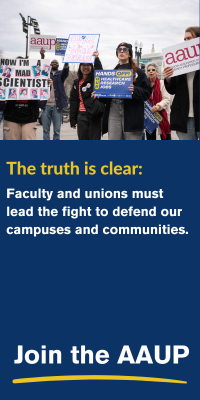- About
- Programs
- Issues
- Academic Freedom
- Political Attacks on Higher Education
- Resources on Collective Bargaining
- Shared Governance
- Campus Protests
- Faculty Compensation
- Racial Justice
- Diversity in Higher Ed
- Financial Crisis
- Privatization and OPMs
- Contingent Faculty Positions
- Tenure
- Workplace Issues
- Gender and Sexuality in Higher Ed
- Targeted Harassment
- Intellectual Property & Copyright
- Civility
- The Family and Medical Leave Act
- Pregnancy in the Academy
- Publications
- Data
- News
- Membership
- Chapters
From the Editor: The AAUP's Second Century
Ralph Waldo Emerson, speaking in 1837, claimed that the scholar “must take up into himself all the ability of the time, all the contributions of the past, all the hopes of the future. He must be [a] university of knowledges.” In 1915, well into the following century, the AAUP attempted to codify and protect this vision through its Declaration of Principles on Academic Freedom and Academic Tenure.
The last two centuries have shown the power of the Emersonian vision as John Dewey and others furthered it and brought it to the heart of the AAUP. It is now our duty, as the AAUP enters its second century and as the American university system fights to maintain its integrity, to define the place of scholars anew within a rapidly changing and globalizing American culture. With its invigorated commitment to advocacy and organizing, the AAUP is poised to grow even stronger as a voice for scholars both on campus and in the broader public sphere.
This issue of Academe is a forward-looking counterpart to our January– February 2015 issue on the AAUP’s first one hundred years. But any look forward is also a look back. Much of what you will read in this issue shows that there is no break between the past and the future, that the AAUP continues its traditions even as it becomes fully involved in a new age of corporate university structures and digital possibilities.
The issue leads off with Henry Reichman’s discussion of the future of that core AAUP principle, academic freedom. Following his piece, Adrianna Kezar and Elizabeth Holcombe share what they have learned from their work at the Delphi Project on the Changing Faculty and Student Success.
Next, Risa L. Lieberwitz considers the possibilities of faculty unionization at private universities, something that was all but stopped in its tracks by the US Supreme Court’s 1980 Yeshiva decision. Dànielle Nicole DeVoss then discusses the changing landscape of intellectual property, a particularly sticky problem as universities begin to see themselves as corporate entities.
Laura M. Portnoi and Sylvia S. Bagley examine how globalization is affecting institutions in the United States and around the world. Even as we look beyond our borders, the AAUP is also focusing greater attention on what some see as forgotten institutions within the country, our community colleges. Paul Davis describes his career as a community college professor and member of an AAUP collective bargaining chapter.
Beating a drum that needs constant sounding, Jeffrey Scheuer describes once more why the liberal arts are important even in a STEM-dominated world. Walter Benn Michaels and Scott McFarland follow with an account of how all of us, tenured, tenure-track, and non-tenure-track, can become a single faculty. Finally, Tom McBride offers a tongue-in-cheek preview of what our universities might look like a generation from now.
With this issue, Academe welcomes a new book review editor, Michael DeCesare of Merrimack College, and the two reviews included here are especially appropriate to our theme. Matthew Finkin revisits the Association’s founding in his review of the first comprehensive work on early AAUP history published since the 1950s, while Gaye Tuchman takes a critical look at the “new American university” in her review of a book by two senior administrators.
In online-only articles, Timothy Shiell discusses how one university is grappling with the concept of “collegiality,” something more and more frequently invoked (AAUP objections notwithstanding) as a component of promotion and tenure, and I discuss areas in the online world where the AAUP is going to find itself working with more and more frequency.



